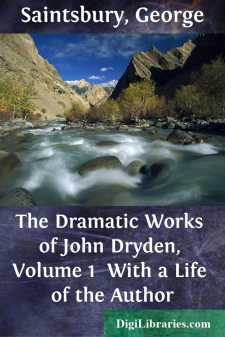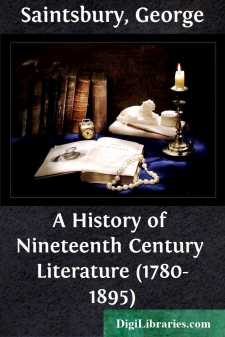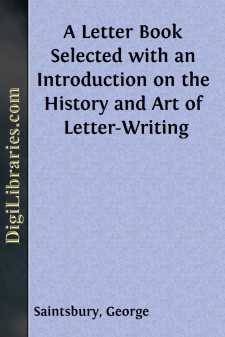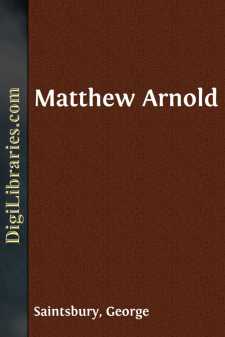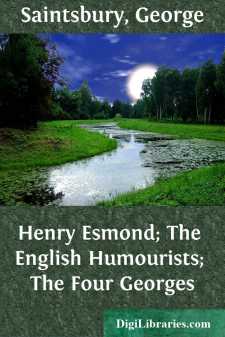Categories
- Antiques & Collectibles 13
- Architecture 36
- Art 48
- Bibles 22
- Biography & Autobiography 813
- Body, Mind & Spirit 142
- Business & Economics 28
- Children's Books 17
- Children's Fiction 14
- Computers 4
- Cooking 94
- Crafts & Hobbies 4
- Drama 346
- Education 46
- Family & Relationships 57
- Fiction 11829
- Games 19
- Gardening 17
- Health & Fitness 34
- History 1377
- House & Home 1
- Humor 147
- Juvenile Fiction 1873
- Juvenile Nonfiction 202
- Language Arts & Disciplines 88
- Law 16
- Literary Collections 686
- Literary Criticism 179
- Mathematics 13
- Medical 41
- Music 40
- Nature 179
- Non-Classifiable 1768
- Performing Arts 7
- Periodicals 1453
- Philosophy 64
- Photography 2
- Poetry 896
- Political Science 203
- Psychology 42
- Reference 154
- Religion 513
- Science 126
- Self-Help 84
- Social Science 81
- Sports & Recreation 34
- Study Aids 3
- Technology & Engineering 59
- Transportation 23
- Travel 463
- True Crime 29
George Saintsbury
George Saintsbury (1845-1933) was a distinguished British literary critic, scholar, and historian renowned for his comprehensive works on English and French literature. He authored seminal texts such as "A History of English Prosody" and "A History of Criticism," which remain influential in the study of literary history and criticism. Saintsbury's meticulous scholarship and passionate appreciation for the art of writing significantly shaped the understanding and evaluation of literature in his era.
Author's Books:
Sort by:
ADVERTISEMENT. [Prefaced to Edition issued in 1808, edited by Sir Walter Scott.] After the lapse of more than a century since the author's death, the Works of Dryden are now, for the first time, presented to the public in a complete and uniform edition. In collecting the pieces of one of our most eminent English classics,—one who may claim at least the third place in that honoured list, and who...
more...
PREFACE In the execution of the present task (which I took over about two years ago from hands worthier than mine, but then more occupied) some difficulties of necessity occurred which did not present themselves to myself when I undertook the volume of Elizabethan Literature, or to my immediate predecessor in grappling with the period between 1660 and 1780. The most obvious and serious of these was the...
more...
PREFACE. An attempt to present to students a succinct history of the course of French literature compiled from an examination of that literature itself, and not merely from previous accounts of it is, I believe, a new one in English. There will be observed in the parts of this Short History a considerable difference of method; and as such a difference is not usual in works of the kind, it may be well...
more...
PREFACE When my publishers were good enough to propose that I should undertake this book, they were also good enough to suggest that the Introduction should be of a character somewhat different from that of a school-anthology, and should attempt to deal with the Art of Letter-writing, and the nature of the Letter, as such. I formed a plan accordingly, by which the letters, and their separate Prefatory...
more...
Chapter I. Life till Marriage, and Work till the Publication of the Poems of 1853. Even those who are by no means greedy of details as to the biography of authors, may without inconsistency regret that Matthew Arnold’s Letters do not begin till he was just five-and-twenty. And then they are not copious, telling us in particular next to nothing about his literary work (which is, later, their constant...
more...
INTRODUCTION It is sometimes thought, and very often said, that political writing, after its special day is done, becomes more dead than any other kind of literature, or even journalism. I do not know whether my own judgment is perverted by the fact of a special devotion to the business, but it certainly seems to me that both the thought and the saying are mistakes. Indeed, a rough-and-ready refutation...
more...
INTRODUCTION. [Illustration] Thackeray In His Study At Onslow Square. From a painting by E. M. Ward We know exceedingly little of the genesis and progress of Esmond. “It did not seem to be a part of our lives as Pendennis was,” says Lady Ritchie, though she wrote part of it to dictation. She “only heard Esmond spoken of very rarely”. Perhaps its state was not the less gracious. The Milton girls...
more...
INTRODUCTION THE KINDS OF CRITICISM It is probably unnecessary, and might possibly be impertinent, to renew here at any length the old debate between reviewers as reviewers, and reviewers as authors—the debate whether the reissue of work contributed to periodicals is desirable or not. The plea that half the best prose literature of this century would be inaccessible if the practice had been...
more...
PREFACE "The second chantry" (for it would be absurd to keep "temple") of this work "is not like the first"; in one respect especially, which seems to deserve notice in its Preface or porch—if a chantry may be permitted a porch. In Volume I.—though many of its subjects (not quite all) had been handled by me before in more or less summary fashion, or in reviews of individual...
more...
PREFACE In beginning what, if it ever gets finished, must in all probability be the last of some already perhaps too numerous studies of literary history, I should like to point out that the plan of it is somewhat different from that of most, if not all, of its predecessors. I have usually gone on the principle (which I still think a sound one) that, in studying the literature of a country, or in...
more...


